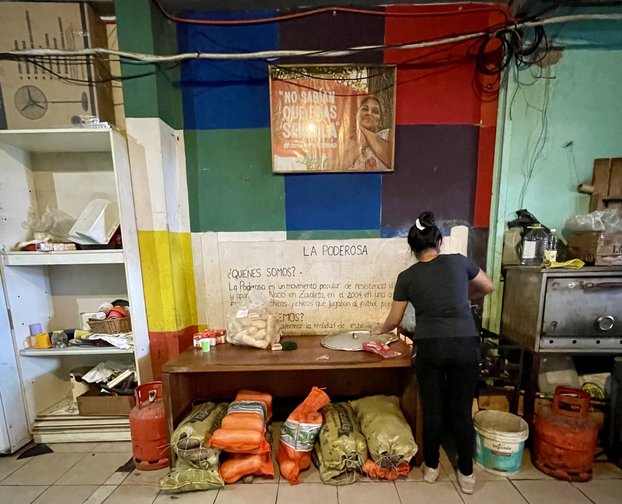
Women fight back as Milei’s government tries to starve their soup kitchens
Community cooks are keeping ‘common pots’ alive despite dwindling supplies and a campaign to paint them as corrupt


BUENOS AIRES — “Many families come to the soup kitchens,” says Alicia Casimiro. “Also unemployed people who weren’t coming before. There are elders, pregnant women and many children.”
Casimiro runs a community kitchen in Villa 31, a slum neighbourhood in the centre of Buenos Aires, right next to the most exclusive district of the Argentine capital. But despite the opulent old homes, mansions and lavish lifestyles that characterise nearby Recoleta, dwindling supplies at the soup kitchen just a couple of kilometres away have left it struggling to fill everyone’s plates. “The only thing we manage to cook is a stew, without enough vegetables,” says Casimiro.
Griselda Burgueño tells openDemocracy a similar story. “Bread is in short supply,” she says. “It’s not enough.” Burgueño runs another soup kitchen in Gregorio de Laferrère, a town in the La Matanza district of the Buenos Aires province, 30 kilometres from Villa 31. “We used to fill people’s tupperware so their families would have enough to eat at lunch and dinner. Now we can’t do that, or people further back in the queue won’t eat at all.”
Casimiro and Burgueño are two of the 140,000 women in Argentina who have taken on the burden of fighting hunger in addition to their daily work and routines, cooking for more than ten million people who rely on the soup kitchens known locally as ‘common pots’ (ollas populares).
But in recent months, the burden has become unbearable.
The government of Javier Milei, the right-wing libertarian president who took office in December, cut the distribution of pasta, rice, yerba and other non-perishable foodstuffs to the soup kitchens almost immediately. The minister of human capital, Sandra Pettovello, claimed the government would hold “audits” to curb alleged “extortion” by groups that run some of the soup kitchens – organised communities of ‘villas miseria’ (misery villages, as these slums are derogatorily known) and ‘picketers’, groups of organised unemployed workers whose protests against poverty and inequality have cut off streets and highways.
“Why does the government make enemies out of us cooks?” asks María Claudia Albornoz, a leader of La Poderosa, one of the largest slum dwellers movements – villeros movements – in Argentina. La Poderosa has been organising through neighbourhood forums since 2004 and manages 158 community kitchens throughout the country, including the one in Villa 31.
Casimiro, also a member of La Poderosa, adds: “We would love for everyone to have a plate of food at home and the family support they need to get ahead and better themselves. But this is what it is.”
‘Villera’ tradition
Villa 31 has its origins in the 1930s, when immigrants and workers from Paraguay, Bolivia and northern Argentina settled in the area beside the Buenos Aires port and its job opportunities. After the assassination in 1974 of the Catholic priest Carlos Mugica, who funded the ‘villeros’ priests movement for pastoral and social work in the neighbourhood, the shantytown was dubbed the Mugica neighbourhood in his honour.
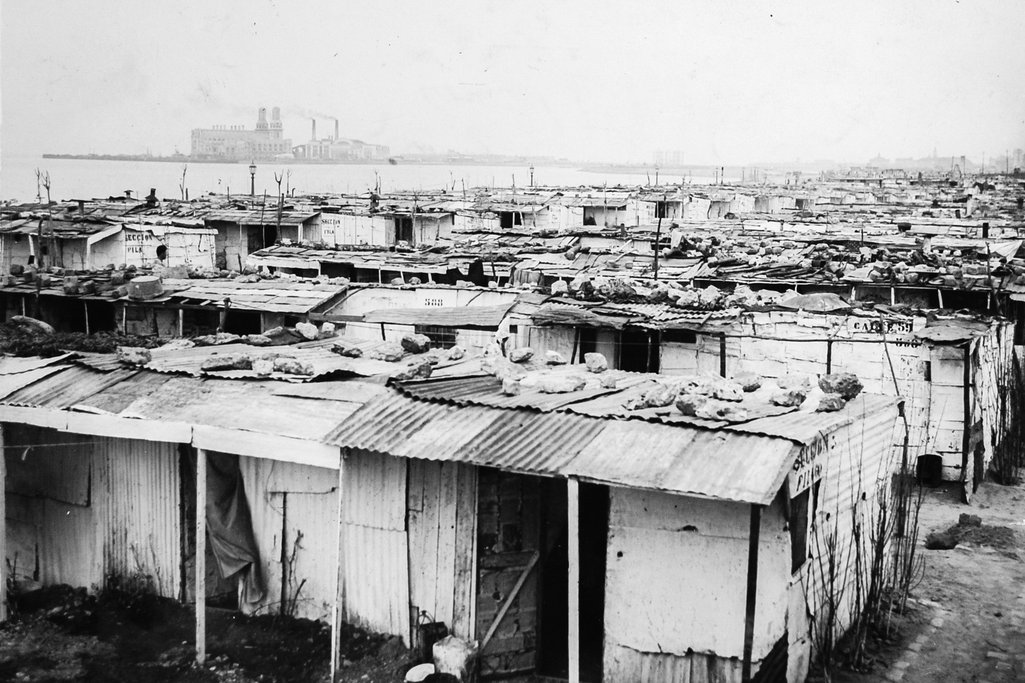
A view of Villa 31, or the Mugica neighbourhood, in the 1930s, when it was known as Villa Unemployment
Government of the City of Buenos Aires
Today Villa 31 has more than 40,000 inhabitants. The land it occupies separates the port area from Recoleta, which is one of the city's most expensive neighbourhoods. The Dr Arturo Umberto Illia road runs overhead, supported by thick concrete pillars.
The reputation of the area in its shadow is so bad that no bus routes enter Villa 31 despite the nearby Retiro terminal. Taxis and Uber cabs refuse to serve the neighbourhood. Not even ambulances will go in without a police escort.
Over hollow brick and tin houses, shacks and narrow passages without pavements, a risky-looking power line is strung up between makeshift pylons, sometimes dangling just inches from people’s heads. There are chapels, schools, squares and small football pitches with gates. Here and there, people with grey-tinged skin gather around a fire lit in a tin tank, despite the heat, and sway to the rhythm of the cumbia villera music that grew out of Argentina’s slums.
And at this very edge of life, you find the knowing, friendly, exhausted faces of 11 cooks in the ‘Gustavo Cortiñas’ soup kitchen – named after a young activist who disappeared during the last military dictatorship between 1976 and 1983. They are sharing the last food of the day. They work six to eight hours a day cooking and serving food, and cleaning and managing the kitchen. Now they are also selling homemade ice cubes to neighbours in an effort to raise more cash, though it is not enough to fill the gap.
These women began organising in 2016. “They didn’t have anyone to leave their children with to work, or they couldn’t find work,” says Casimiro, a mother of eight. “So, seeing their own needs and those of the others, they formed a community.” Pooling their resources, the group rented a small house with a large living room in the front and a kitchen in the back, where they set up the lunch room, initially just for each other, although it soon grew. “A plate of food helps you save a little of your daily expenses,” says Casimiro.
In addition to working for the community, they perform care and domestic work in their own homes, while some have casual jobs as well – which is why they call themselves “triple shift workers”.
In mid-2023, La Poderosa drafted a bill, still not seen in Congress, to provide community cooks with minimum wage, healthcare coverage, paid holidays, maternity leave and Christmas bonuses.
Common pots also serve as places of emotional support for neighbours, and as a “line of defence” against drug abuse and trafficking.
“Even if parents go out to work, they don’t earn enough to feed their family. And going to work means they don’t have time to take care of their children,” says Casimiro, who has lived in the slum for 33 of her 49 years. Out of despair, sometimes parents or – children – start dealing (or using) drugs. “One grabs whatever there is to be able to bring home some food... Everything here fuels violence.”
The Argentine capital is home to 49 ‘villas’ where some 80,000 families live in overcrowded conditions, without regular access to electricity, water, heating and sanitation. Nearly three quarters of these households, some 73%, are headed by women. As in many of the 6,500 slums across the country, women have been working side by side for decades to feed their communities.
When torrential rain falls, as it did in March, the water is knee-deep, soaking mattresses, wardrobes and appliances, and leaving people without power for days – the fear of an electric shock from using wet plugs and cables outweighs the need.
But even when the sun comes out, the damage done by years of repeated flooding is inescapable. Sewers burst due to lack of infrastructure to supply a growing population, while streets are full of mud and vermin. “Living with the smell of damp everywhere is not life,” Casimiro says.
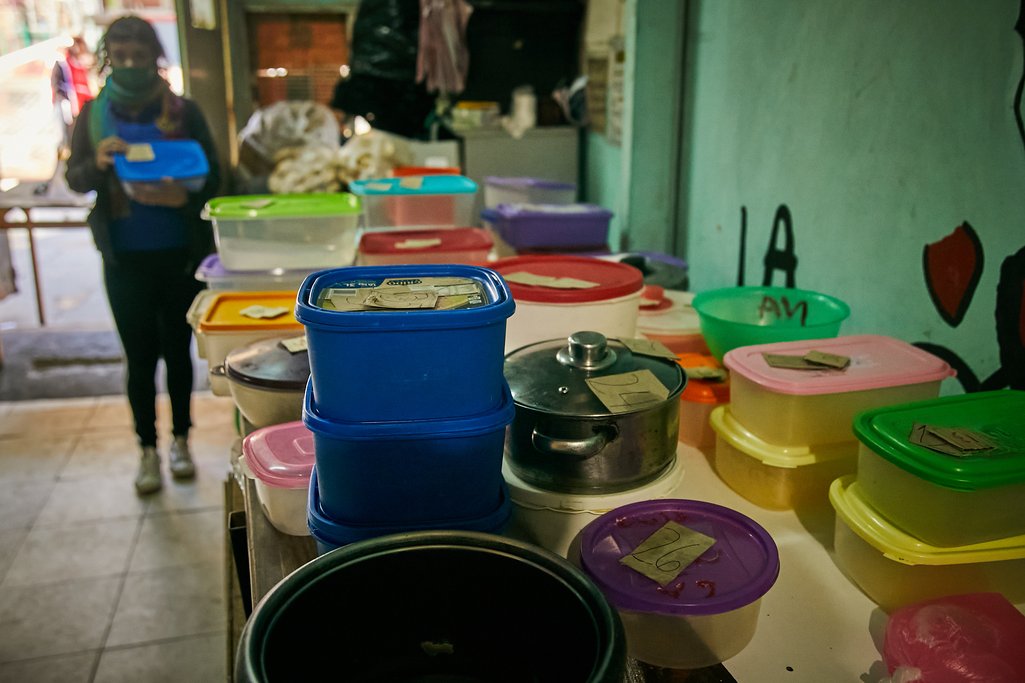
Cooks at the 'Gustavo Cortiñas' community kitchen receive daily hundreds of plastic containers they fill with food and serve at midday
Courtesy of La Poderosa
Thanks to the meticulous and constant work of the villeras, La Poderosa organises donations of clothes, electrical appliances and furniture. It also provides assistance to people who suffer gender violence, as well as trade workshops and classes for children in the neighbourhoods. In addition, it amplifies the cultural voice of the villas in a monthly magazine that seeks to counteract the stigma of the villas, which are seen (especially by outsiders) as places of drugs, crime and misery.
“Poverty is so desperate and street violence is so extreme that you can’t live,” says Albornoz. “But if we weren't organised, our neighbourhoods would be in worse shape than they are.”
The luxury of eating
Standing in the centre of the village, Casimiro points to a line of 30 people queueing for leftovers. “Before the Covid-19 pandemic, we used to prepare about 120 meals a day,” she says. “During the pandemic we gave out 500, and now we are at more than 420, depending on whether we have enough food.”
A typical daily menu would include mate cocido, a herbal tea made from the yerba mate plant, and tortas fritas (fried wheat flour cakes) to start the day. For lunch, there might be a rice or noodle stew with pumpkin, onion and, when available, tomato sauce, chicken wings or giblets. As a snack, people might get milky tea and cakes. Faced with the cut in supplies, however, many community kitchens have either closed their doors or reduced the frequency and quantity of food they offer – in the worst cases, the meal is little more than paprika in hot water.
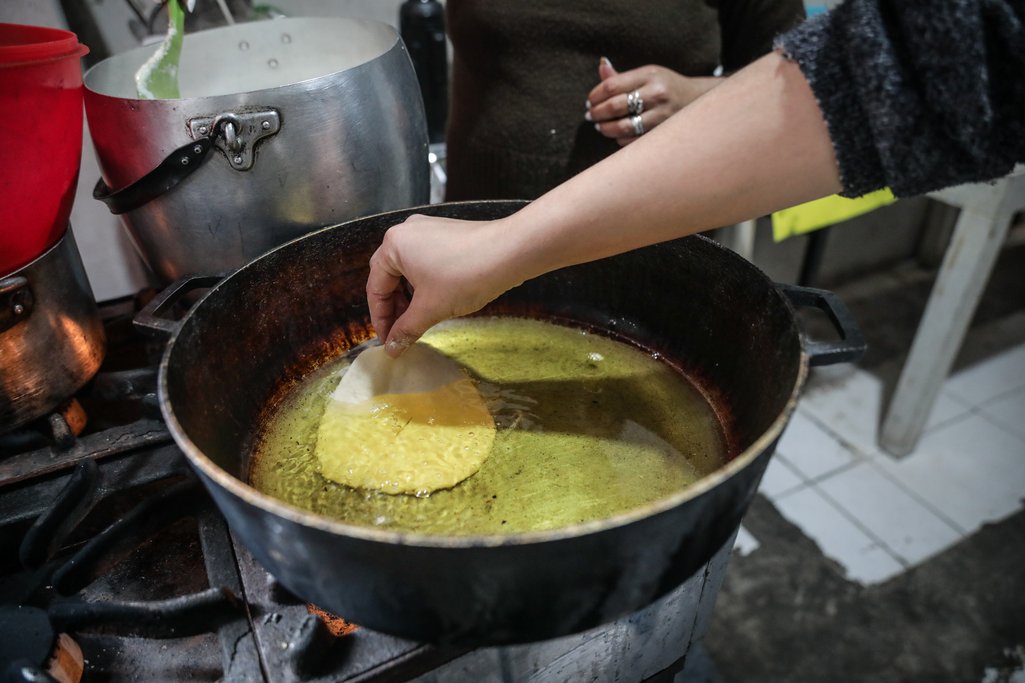
A cook from the Villa 21-24 neighbourhood in Buenos Aires city prepares ‘tortas fritas’
Courtesy of La Poderosa
Argentina suffered the world’s highest rate of food inflation in February, with agri-food prices seeing a threefold mark-up from farm to shop. While local food prices are similar to those in Spain or the United States, the minimum wage in Argentina is the equivalent of $210 a month, as opposed to $1,220 in Spain and $1,160 in the US. In Argentina, the average salary is not enough to keep a family above the poverty line.
As in other Latin American countries, food insecurity is higher among women than men, but Argentina has the largest such gap.
With an inflation rate at 254%, the economy deregulated and a government that simply repeats the line “there is no money” – an echo, perhaps, of former British prime minister Margaret Thatcher’s slogan “there is no alternative” – incomes and quality of life are deteriorating daily.
“No income in pesos can hold out,” says economist Candelaria Botto, director of Economía Feminista – a think tank and campaign association that seeks to expose gender inequality in the world of work and the market. “The emergency situation is very serious, especially in poor neighbourhoods.”
Economic insecurity is also reflected in the drastic drop in medicine consumption. Between December 2023 and the beginning of March, drug prices rose 100%, and there was a huge drop in sales and access to medical treatments. In no other country in the world have medicine prices risen so much in such a short period of time.
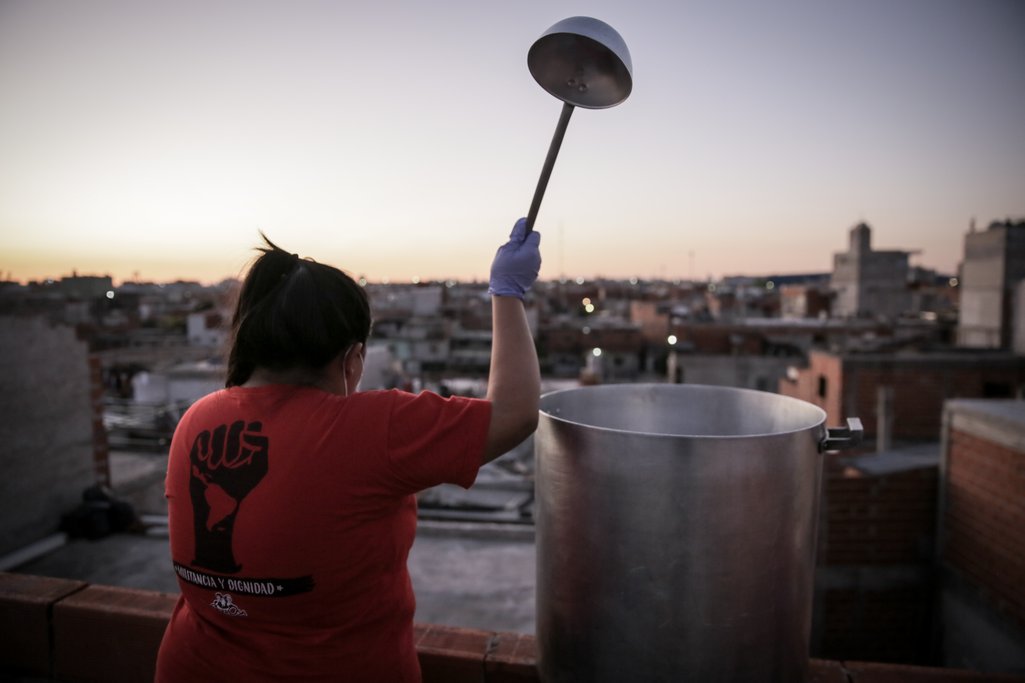
A cook from the ‘La Poderosa’ villero movement
Courtesy of La Poderosa
Poverty affects 57% of the 46 million inhabitants, seven million of whom are children and adolescents – and 15% live in extreme poverty, including 2.4 million children.
“We insist on talking about economic violence, because the government is systematically applying violence and economic terror on the population,” says Lucía Cavallero, a researcher at the University of Buenos Aires and member of the Ni Una Menos movement, which fights against gender violence.
Eating to organise
La Poderosa and a myriad of social, civil and religious groups that run some 44,000 soup kitchens across the country used to receive dry food from the national government, plus donations of meat and vegetables from businesses, local shops and neighbours. In some cases, soup kitchens also attracted donations from provincial governments and even cash from the state or funds from international UN programmes. This money, plus resources from activities such as bingo or cardboard and glass recycling, paid for the rent, gas or firewood for the community kitchens.
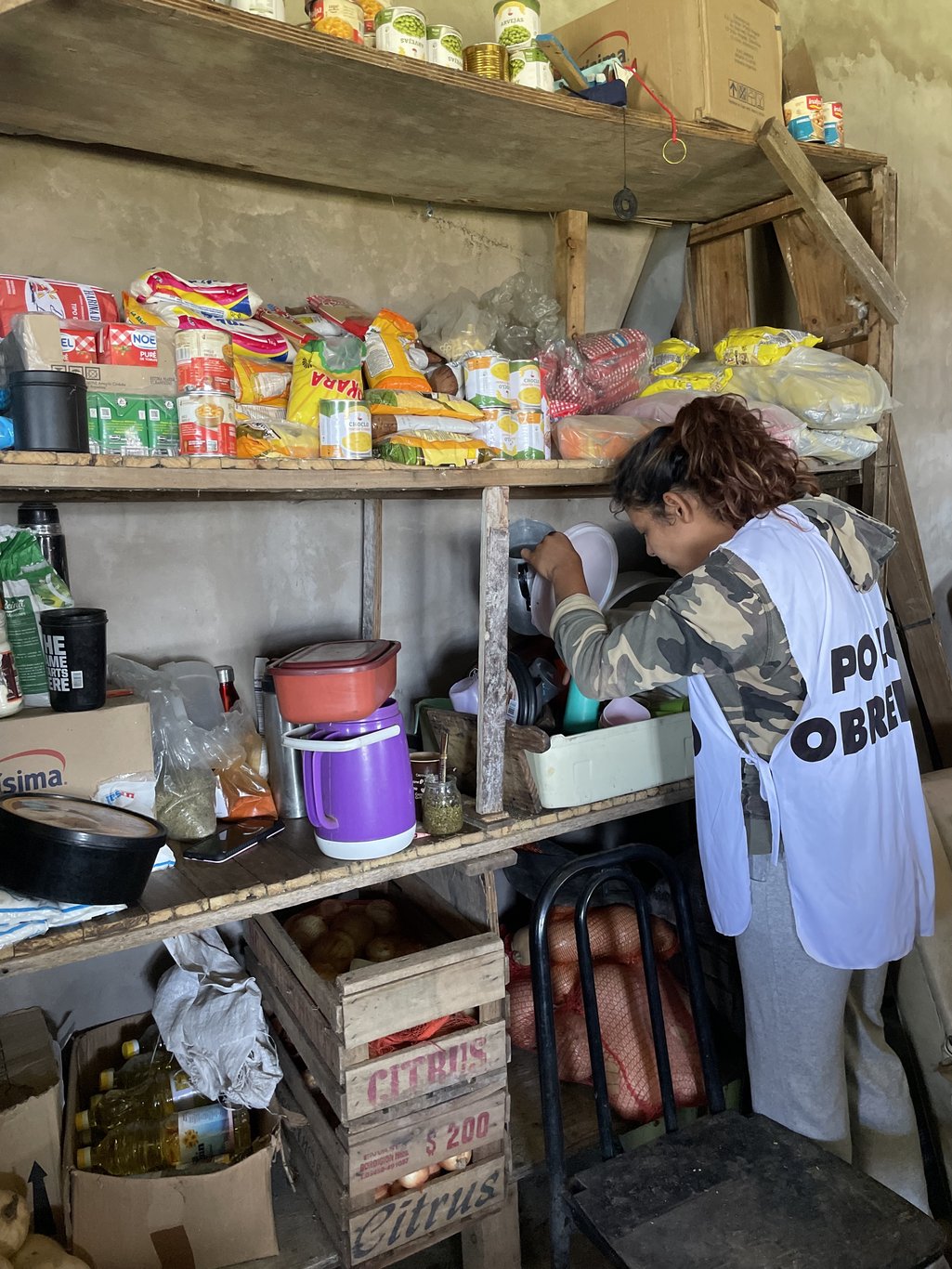
Soup kitchen supported by Polo Obrero in Gregorio de Laferrère, La Matanza, Buenos Aires province
Angelina de los Santos/openDemocracy
The new government bases its drastic cuts on the alleged “discretionary and extortive” use of these resources by the groups that run the food kitchens, and claims that more than half of the 44,000 registered soup kitchens either aren’t functioning or don’t exist at all. As for public complaints by community leaders about the lack of food, the authorities say they are an expression of “the dispute over the uncontrolled and unaccountable distribution of this food”.
Albornoz, of La Poderosa, says these accusations are baseless. “The figure of the middleman does not exist,” she said in a radio interview. The former Ministry of Social Development – axed by Milei’s government – “bought the food consignments and delivered them with a small truck to the registered kitchens. We would take the goods off the truck and store them, and they would serve us for one or two months, depending on the number of meals we delivered.”
Seizures and picketers resistance
Gabriela De la Rosa, of the Polo Obrero picket movement, affiliated to the Trotskyist Partido Obrero (Workers’ Party), says: “Women are the first to organise when there is a crisis... and therefore they are the ones who most take over the organisations in the slums.”
They have been doing so for decades, particularly since the economic and social crisis that erupted in 2001, when Argentina went into default. At that time, female picketers organised themselves to bring food to the most vulnerable neighbourhoods. They now run some 3,000 community kitchens and provide trade workshops throughout the country.
The need, and an absent state, led neighbours to set up cooking pots in 70 locations across La Matanza, says Lilián Rojas, who is leader of the Polo Obrero in Buenos Aires province and stood as a council candidate in La Matanza in 2023. “Hunger is not going to kill us.”
In the Villa Unión community kitchen in Gregorio de Laferrère, it takes the volunteers less than 40 minutes to get through the 1,000 meals. More and more frequently, the cooks themselves have to go without.
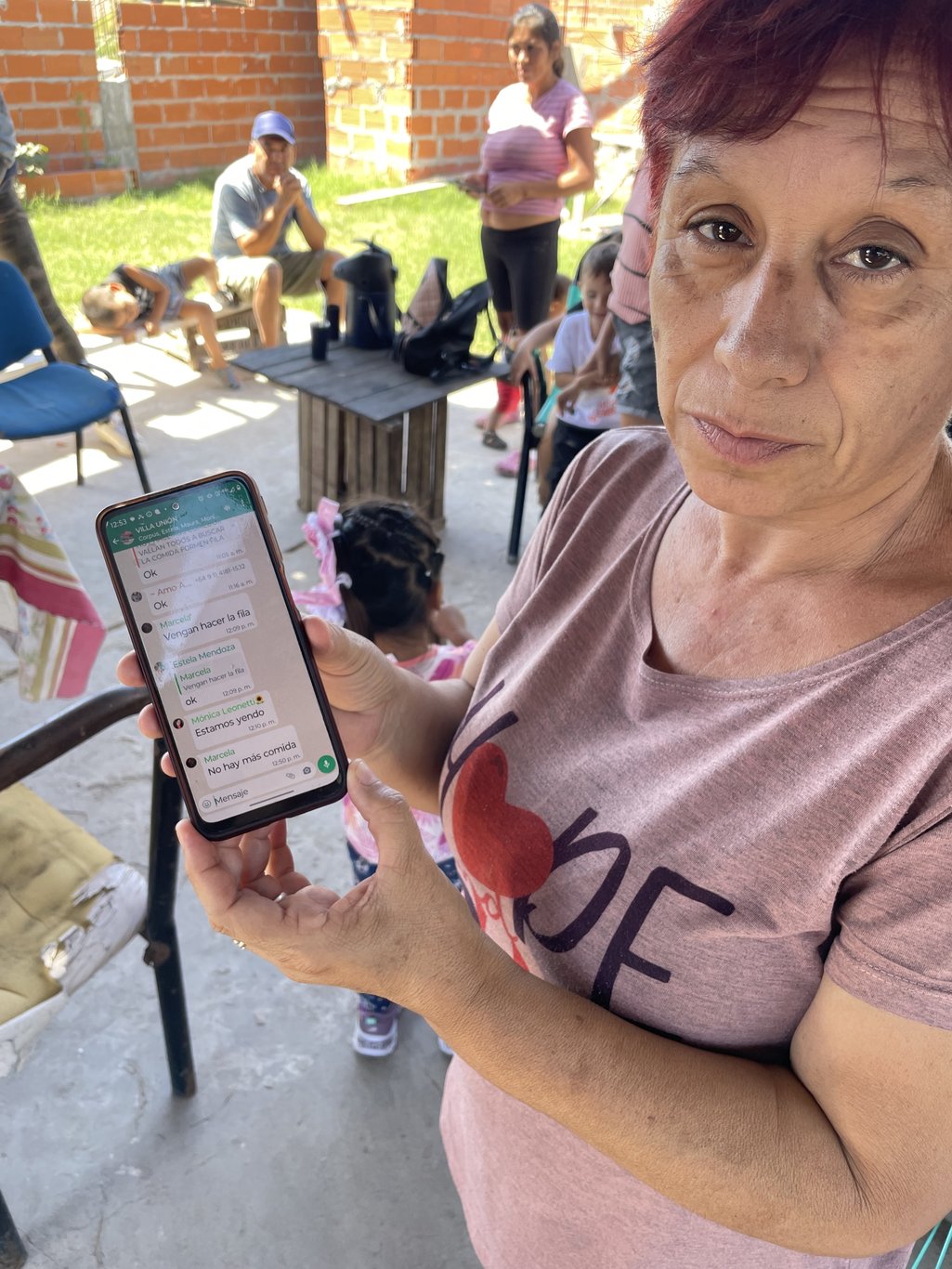
Griselda Burgueño shows WhatsApp messages announcing food has finished in one of the Polo Obrero’s common pots in Villa Unión
Angelina de los Santos/openDemocracy
Nearby, also in Villa Unión, some 600 picketer families have settled on vacant public land where until 2017 there was nothing but fields, rubbish and rubble; they “took it over”, says Rojas. Three common pots serve food on this seized patch of land, each with its own name: Sector 3, Nueva Unión and Río Cuarto.
“We are so experienced in hunger and misery that we make do with what we have. We know how to build a common pot and go out and beg for staples. That’s how we work and that’s how we will go on,” she adds.
Richard Marelo, a neighbour in the occupied land and in charge of the Sector 3 pot, explains: “We collaborate to buy cables, put up poles and build streets.” They live in constant dispute with the local authorities, who want to eradicate the settlement. Now, says Marelo, police won’t even let trucks in to dig wells for the septic tanks and to draw water.
Without women, families would not be able to occupy the land, according to Rojas. “They are the main thing to hold up the occupation, where there is nothing, as repression increases. We brought the casserole pot from the beginning so that all the people who were going to take the land could eat with their children.”
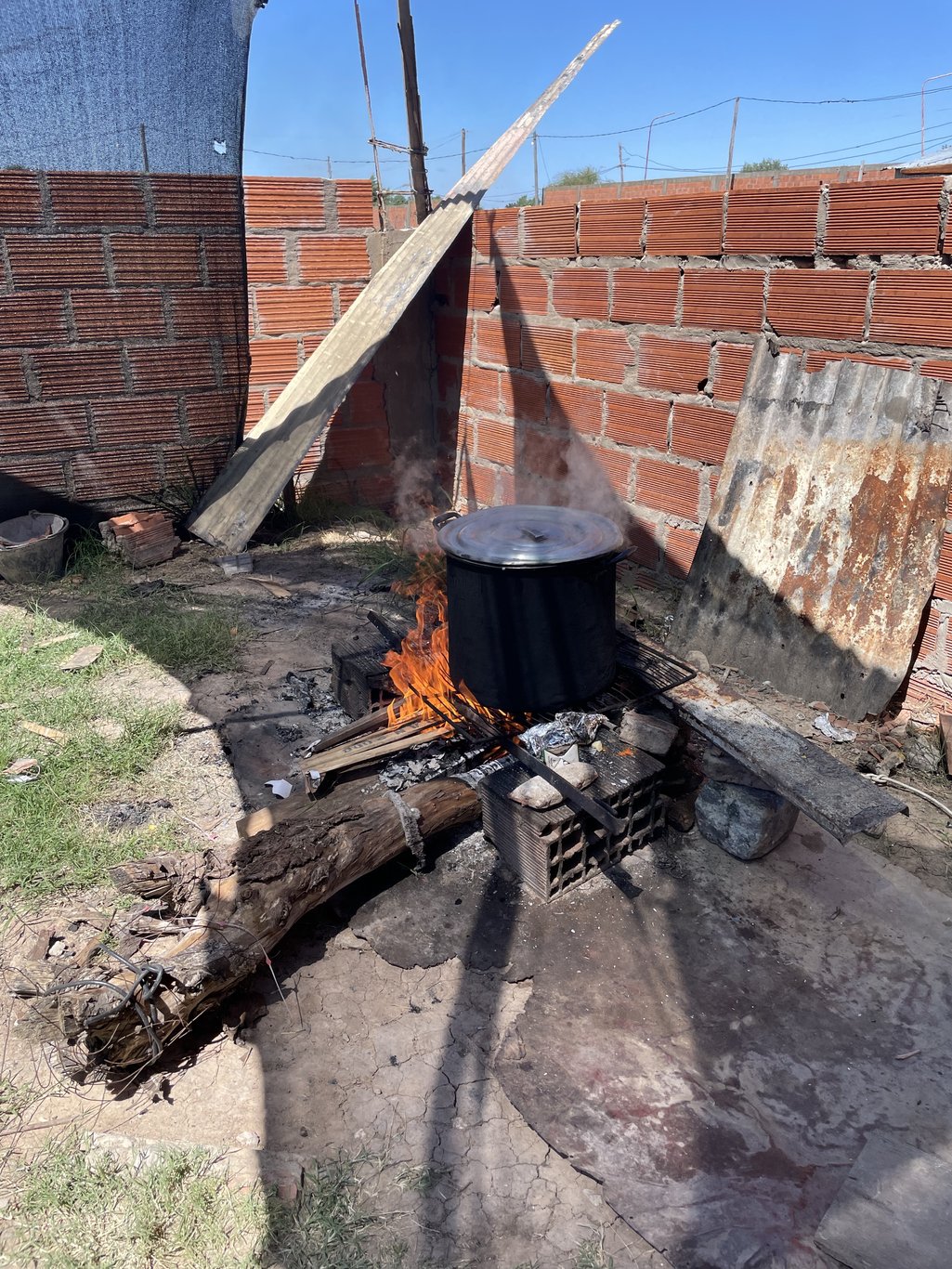
Wood-burning cooker in the Sector 3 common pot, in Villa Unión settlement
Angelina de los Santos/openDemocracy
Around us are huts made of canvas, wood, cardboard, sheet metal, rubber and blocks, with openings covered or closed with metal sheets or other available material. Their floors are made of dirt or, at best, cement. There are buckets for washing up, grills and firewood for cooking when there is no gas, as well as tables, chairs, shelves and makeshift cupboards.
Thefts are common. “Hunger makes them steal our power sockets, water pumps and vegetables from the garden,” says Rojas. “We can’t have anything because they steal even our pumpkins.”
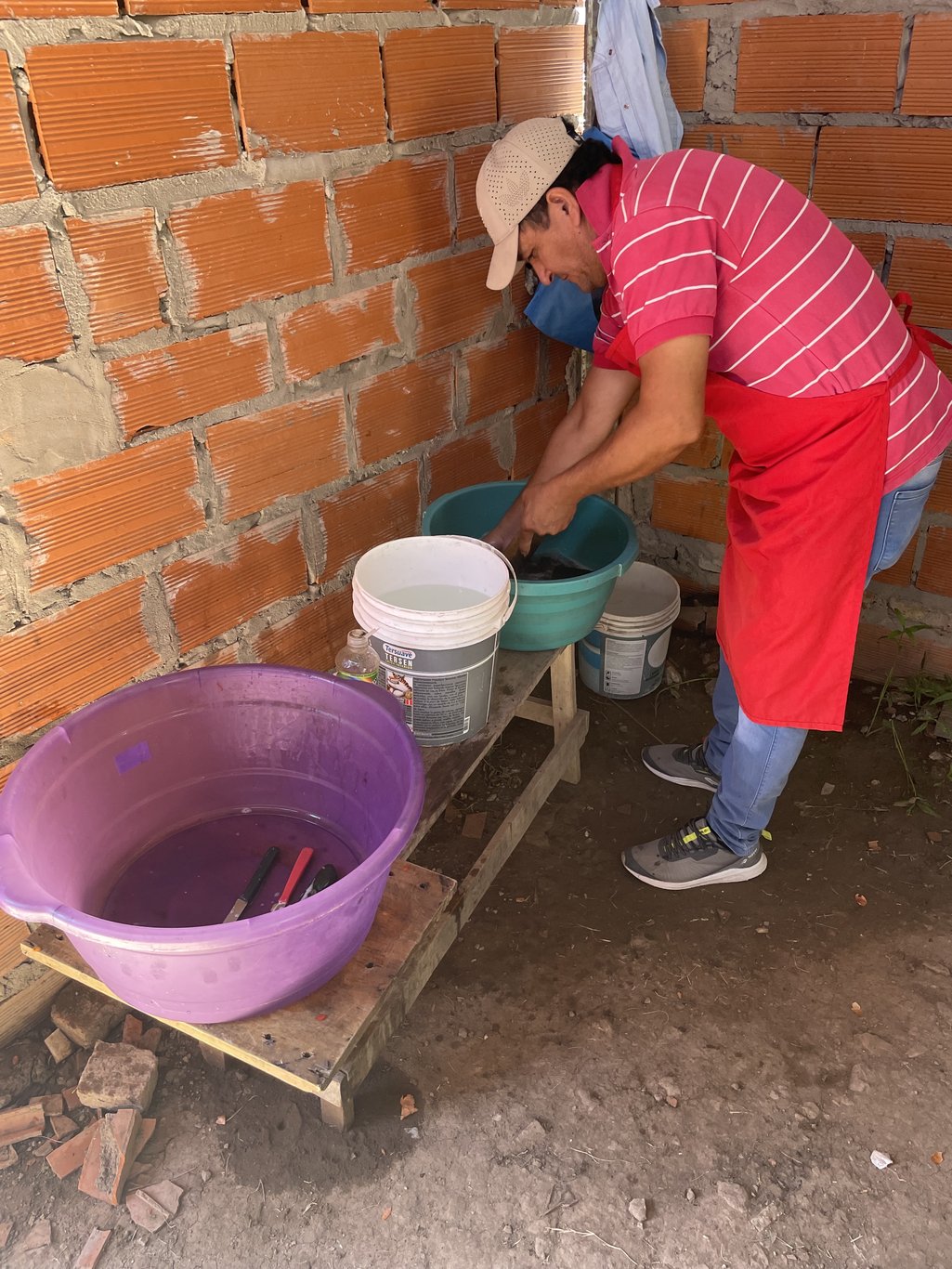
An activist of the Polo Obrero washes kitchen utensils in buckets at the Nueva Unión pot in the Villa Unión seizure
Angelina de los Santos/openDemocracy
In this hostile environment, collective work feeds thousands. “We started under a tent, sending everything to the fire. We had nothing, just hunger and misery,” says María Zárateu, 37, at the Nueva Unión cooking pot. Volunteers measure out rice while children queue up, clutching plastic containers to their chests.
“Step by step we got gas and the stove, and for five years now we have been cooking for 200 families every day,” she adds.
At the cooking pot in Río Cuarto, Antonia Cáceres, 34, says volunteers are using the little money they have in their pockets to buy food. “We need more and more help and the government still hasn’t dropped a kilo,” she complains. They serve around 50 families here. Her comrade Rocío Fernández, 23, says many pensioners and children come here.
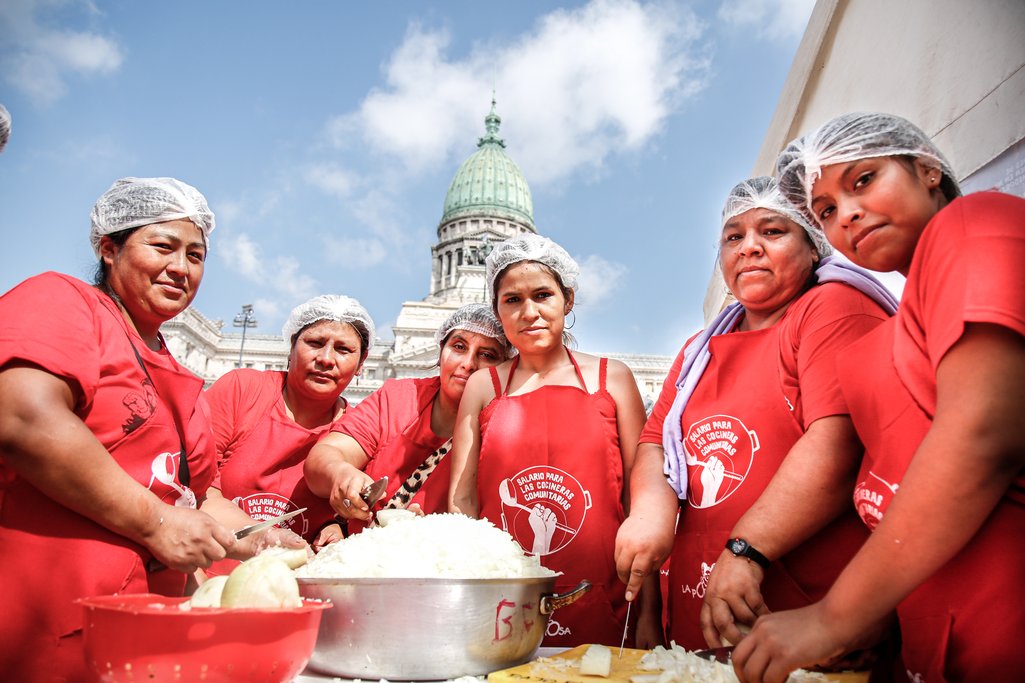
La Poderosa cooks at a protest in the Argentinean Congress square
Courtesy of La Poderosa
“We women are sustaining the neighbourhoods in a very difficult way,” says Albornoz, from La Poderosa. “We are very tired, exhausted, but we can still organise ourselves.”
Read more
Get our weekly email




Comments
We encourage anyone to comment, please consult the oD commenting guidelines if you have any questions.